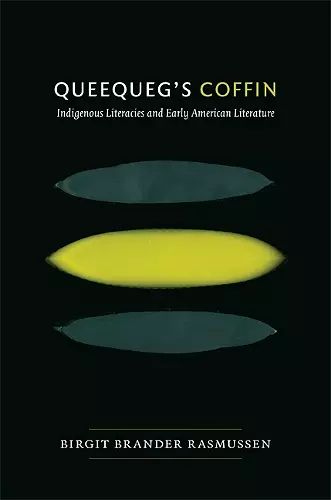Queequeg's Coffin
Indigenous Literacies and Early American Literature
Birgit Brander Rasmussen author
Format:Paperback
Publisher:Duke University Press
Published:6th Jan '12
Currently unavailable, and unfortunately no date known when it will be back

Rather than seeing American literature as beginning with the writings of English or Spanish colonists, Brander Rasmussen points to the wide variety of indigenous writing in the Americas prior to colonization. From the earliest periods of colonial arrival, there were conversations between indigenous people and European settlers and between their texts as well. Brander Rasmussen proposes a literature of the Americas that includes both indigenous and alphabetic literatures and looks comparatively at the interactions. The study looks at writing between 1524 and the mid-19th century work of Herman Melville.
Rather than seeing American literature as beginning with the writings of English or Spanish colonists, Brander Rasmussen points to the wide variety of indigenous writing in the Americas prior to colonization. The study looks at writing between 1524 and the mid-19th century work of Herman Melville.The encounter between European and native peoples in the Americas is often portrayed as a conflict between literate civilization and illiterate savagery. That perception ignores the many indigenous forms of writing that were not alphabet-based, such as Mayan pictoglyphs, Iroquois wampum, Ojibwe birch-bark scrolls, and Incan quipus. Queequeg's Coffin offers a new definition of writing that comprehends the dazzling diversity of literature in the Americas before and after European arrivals. This groundbreaking study recovers previously overlooked moments of textual reciprocity in the colonial sphere, from a 1645 French-Haudenosaunee Peace Council to Herman Melville's youthful encounters with Polynesian hieroglyphics.
By recovering the literatures and textual practices that were indigenous to the Americas, Birgit Brander Rasmussen reimagines the colonial conflict as one organized by alternative but equally rich forms of literacy. From central Mexico to the northeastern shores of North America, in the Andes and across the American continents, indigenous peoples and European newcomers engaged each other in dialogues about ways of writing and recording knowledge. In Queequeg's Coffin, such exchanges become the foundation for a new kind of early American literary studies.
"Quequeeg's Coffin sweeps away the origin stories of American literature by beginning with the encounter between European colonialism and indigenous cultures; it revises prevailing notions of 'literacy' and 'writing' by placing indigenous literary traditions alongside, and in dynamic relation to, the alphabetic systems of the colonizers; and it emphasizes the often volatile interactions between, and continuing syncretism among, vastly different notions of literacy. It is the realization of an exciting, ambitious undertaking."—David Kazanjian, author of The Colonizing Trick: National Culture and Imperial Citizenship in Early America
"In Queequeg's Coffin, Birgit Brander Rasmussen looks into the formation of the Americas beyond and below imperial and national boundaries. She invites us to rethink what 'American literature' is, to expand its purview to include not only alphabetic languages, but also non-alphabetic writings throughout the Americas. Queequeg's Coffin announces the end of an era in the national literary imagination. It opens up 'America' beyond the United States."—Walter D. Mignolo, author of The Darker Side of Western Modernity: Global Futures, Decolonial Options
“In asking literary scholars to rethink the basis of what constitutes a text, this fascinating monograph cracks open the field of inter-American literary studies. . . . In the first two chapters, she provides insightful readings of pictography and wampum as textual artifacts that were either misunderstood or denigrated by colonial explorers. The reading of Mary Rowlandson is particularly astute. . . . She goes on to provide an invigorating reading of Herman Melville's Moby-Dick. . . . Highly recommended. Upper-division undergraduates through faculty.” -- D. J. Rosenthal * Choice *
“What is new, and revelatory, in Rasmussen’s study is an illumination of the intertwined archives of American literature, and a firm grasp on what it means aesthetically and politically to recognize the commensurability of indigenous and European colonial forms of literacy. The stakes for the aesthetics run throughout; the rich textures brought forth through her readings demonstrate how much literary scholarship could gain through her dialogic approach.” -- Beth H. Piatote * English *
“In Queequeg’s Coffin, Birgit Brander Rasmussen offers a marvelously detailed and inventive critique of the presumption that Indigenous peoples lacked ‘writing’ and ‘literacy’ prior to Euro-contact/conquest.” -- Mark Rifkin * American Literature *
“Birgit Brander Rasmussen’s Queequeg’s Coffin is an eye-opening deconstruction of the way we consider writing in early American literature. With thorough research, an extensive notes section, and concrete examples, Queequeg’s Coffin is a welcome addition to the realm of early American scholarship.” -- Teresa Coronado * Rocky Mountain Review *
“This books stands as a significant (and, hopefully, not solitary) foray into what could and should be a growing corpus of scholarship on indigenous and alternative literacies in the Americas.” -- Aaron P. Althouse * Hispanic American Historical Review *
ISBN: 9780822349549
Dimensions: unknown
Weight: 340g
224 pages